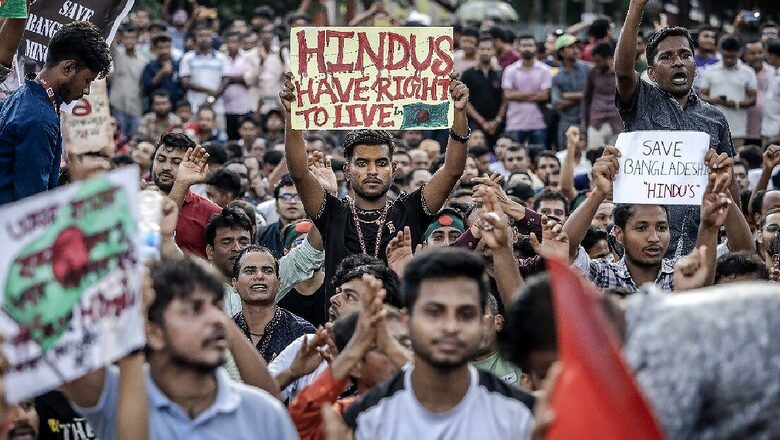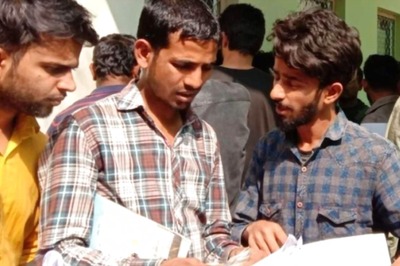
views
Every war, every revolution carries with it a significant share of history marked in red. This red is not an ideology but the colour of bloodshed. The recent turn of events in our neighbourhood, Bangladesh, is evidently the most atrocious human rights violation.
I am reminded of a Facebook conversation I had some time ago with a junior Bangladeshi scholar, who was criticising certain policies and actions of my head of state, drawing examples from social media blunders.
This was occurring while India was repatriating Bangladeshi students along with Indian students from Ukraine. I was shocked to see a scholar and researcher descending to such a level of wisdom. However, this does not make me biased, as I believe there are also sane, moderate, and unbiased voices in Bangladesh.
Unfortunately, extreme events like the one happening in Bangladesh provide an opportunity for haters and violent propagators to turn their malevolent ideologies and injustices into practice.
Extreme ideology with political motives is more dangerous than a nuclear warhead. It cleans and washes away the humanitarian objective and existence of a nation.
Elders in our household used to say that if you want to truly understand a person, observe their behaviour when they are angry. Undoubtedly, Bangladesh as a nation is experiencing anger for reasons known only to them, whether due to political choices or demographic and social issues. However, using this as an opportunity to wreak havoc on minorities and commit crimes against humanity is unacceptable. The responsibility of safeguarding minorities in any country lies with the majority community. Unfortunately, the majority community (read Muslims) in Bangladesh appear to be failing to protect the minorities of their country. This is why Bangladeshi Hindus have organised protest rallies against the attacks on them and their places of worship.
Bangladesh, as a nation, is revealing its potential for regression, oppression, and degradation. Moreover, the images of men, identifiable by their religious attire, gleefully desecrating women’s undergarments demonstrate a profound misinterpretation of Prophet Muhammad’s Islam. The failure of the religious, social, and political leadership in Bangladesh is evident. The mockery of leadership and the violence against minorities represent a severe breakdown in the sense of civilisation that the country and its residents should uphold.
Emotional decisions and reactions often lead to destruction. The Reign of Terror during the French Revolution is one such example. Similarly, the violence following the Partition of India is a stark reminder of extreme hatred. The people of Bangladesh, especially those in positions of authority, must act swiftly to restore normalcy in daily life. They should protect their fellow citizens across caste, religion, and political lines.
Looking back, the initial agitation of the Bangladeshi people was directed against their government, which they successfully dislodged. However, witnessing the ensuing violence, we are appalled that this agitation has taken such a dark turn. If their struggle was indeed for a just cause, how can one rationalise the public display and mockery of looted undergarments?
There is a strong need for voices advocating for peace and human rights in Bangladesh to rise and protect minorities. Violence against Hindu temples must be stopped. It is the responsibility of every Bangladeshi to ensure the safety of minorities and to counteract extreme ideologies. They must act to prevent their nation from garnering global condemnation for its violence against Hindus and other minorities.
If they are Muslims, then they should prove it by protecting minorities in Bangladesh. They should protect their religious places, properties, and lives. History offers guiding examples, like the great Maratha ruler Shivaji Maharaj, who strictly instructed his soldiers and troops never to insult any religious place or religious book, even in war. Similarly, the Afghan ruler Sher Shah Suri instructed his troops to save and protect women and children of minorities. Such leadership embodies the principle that with great power comes great responsibility.
No Muslim would attack innocent people. We have seen many promising pictures where people are protecting temples, Hindu community houses, and people. But this is not enough. They should immediately shun violence and bring their country back to normalcy. There is a strong need for the Bangladeshi diaspora community to come forward and make efforts to protect human rights in Bangladesh.
While what is happening in Bangladesh may be considered an internal matter, atrocities and human rights violations anywhere in the world are of global concern. All Muslim organisations that represent Muslim communities worldwide should unite to condemn any acts of atrocity or violence against minorities in Bangladesh. I urge Muslim leaders and nations to come forward and work towards protecting the rights of Hindus and ensuring their safety as Bangladeshi citizens.
Hate hurts everyone, everywhere. Bangladeshi citizens should remember that during their 1971 war of independence, the Indian Hindu community extended a helping hand. Similarly, during floods and other natural disasters in Bangladesh, their neighbours from India contributed generously to help them cope with these humanitarian crises.
Enough is enough. All right-thinking people in Bangladesh should come forward to denounce violence against the minority community. It is encouraging that the new interim regime has recognised the urgency of the situation and called for an end to the violence. The argument that the attacks are against supporters of the Awami League, whether they are Muslim, Hindu, or of any other religion, does not justify using violence against fellow citizens. Such actions will not benefit the new government or its leadership.
Prime Minister Narendra Modi has also highlighted the need to protect Hindus in Bangladesh. In a post on X, welcoming Nobel Laureate Professor Muhammad Yunus to his new role as chief advisor to the interim government of Bangladesh, PM Modi stated: “My best wishes to Professor Muhammad Yunus on the assumption of his new responsibilities. We hope for an early return to normalcy, ensuring the safety and protection of Hindus and all other minority communities. India remains committed to working with Bangladesh to fulfil the shared aspirations of both our peoples for peace, security, and development.”
Many Indian political leaders, including Rahul Gandhi and West Bengal chief minister Mamata Banerjee, have also called for peace in Bangladesh. The CPI(M) politburo, in a press statement, has urged the interim government to take immediate and firm steps to ensure the safety and security of minorities.
We are also hopeful as Professor Muhammad Yunus, in his speech after returning to Dhaka, has called for the protection of minorities. According to reports, he said, “While coming, I received news that there have been attacks on minorities—Hindus, Buddhists, Christians, and Ahmadiyyas. Our job is to protect them.”
Tarique Rahman, son of BNP leader Khaleda Zia, has also appealed to people to stop the violence. “It is our duty to protect all Bangladeshis, irrespective of religion and politics, from discriminatory violence, and not to harass any particular community, create division, or seek vengeance,” he said in a post on X.
We will need to see if these appeals have an impact on the ground. Bangladesh Nationalist Party (BNP) chairperson and former Prime Minister Khaleda Zia, a rival of Sheikh Hasina, has also stated that “love and peace” are essential to rebuild the nation. Many prominent individuals from various fields have also urged Professor Yunus to ensure the safety of all in Bangladesh.
All Bangladeshis should prove that their country is truly “Amar Sonar Bangla”, as expressed in the national anthem of Bangladesh written by Rabindranath Tagore. They should demonstrate that it is indeed “My (Their) Golden Bengal,” where minorities can live in peace.
Dr Syed Mubin Zehra is a Historian, Academician and a strong voice on gender and human rights. Views expressed in the above piece are personal and solely those of the author. They do not necessarily reflect News18’s views.



















Comments
0 comment